Apr 24, 2024
Apr 24, 2024
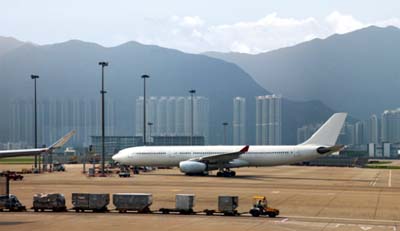 For a while it felt as if the pilot had taken leave of his senses but the aircraft landed quite smoothly without any thump at Chek Lap Kok airport just yards away from the sea. I couldn’t even see a fence or wall separating the two, and thought that I could easily step off the plane and go for a swim before collecting my baggage.
For a while it felt as if the pilot had taken leave of his senses but the aircraft landed quite smoothly without any thump at Chek Lap Kok airport just yards away from the sea. I couldn’t even see a fence or wall separating the two, and thought that I could easily step off the plane and go for a swim before collecting my baggage.
The aircraft now taxied away from the sea however. Ten minutes later I had completed all immigration formalities with the efficiency I had anticipated. I found my baggage and walked outside the airport to see red and green taxis waiting outside. The green ones serve what are called the New Territories and so I had to take a red colored one that serves Hong Kong as well as Kowloon where I was booked to stay at the Harbor Plaza Metropolis, overlooking the Victoria Harbor. It’s as yet historically too early for the harbor’s colonial name to have changed, but as the years go by this will inevitably happen, as will a Chinesification, if that is the right word, of street names.
The term Hong Kong is used in two ways, which may be confusing for first time visitors. Hong Kong, now called the Hong Kong Special Administrative Region of the People’s Republic of China refers to a larger self governing unit, within which are contained Hong Kong itself which in the second sense refers to a smaller part of the territory, Kowloon which is just across the harbor, the much larger island of Lantau, as well as the New Territories.
The airport is situated not in Hong Kong itself – and here I refer to Hong Kong in the second sense – but on the northern side of the island of Lantau and it was from this island that the red taxi began to journey towards Kowloon.
I had been surprised at the aircraft’s landing so close to the sea, and was further surprised not to find tall high-rise buildings outside the airport, which typified the images of Hong Kong that I had based on news channels. What I encountered instead was a lush green mountainous landscape that I would have supposed to be more typical of the island of Cyprus. This landscape, with interesting variations continued for more than half the one-hour journey to Kowloon with no sign of the high-rise buildings. And then, I saw them, with a mixture of anticipation and disappointment.
~*~
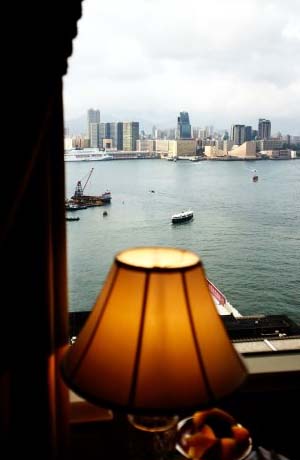 By Hong Kong standards I had booked a reasonably priced accommodation through Last Minute dot com that had come with the promise of a ‘Full Harbor View’.
By Hong Kong standards I had booked a reasonably priced accommodation through Last Minute dot com that had come with the promise of a ‘Full Harbor View’.
What I could see from the window was however only one fourth or at best a third of the harbor – ‘full’ harbor view was a far cry. Thankfully though, Marlene, a young enthusiastic friendly Chinese girl – with Australian nationality – at the front desk came to my rescue and I was upgraded to the executive room that had a proper, truly magnificent and ‘full’ view of the harbor.
From Kowloon, you look across the shimmering sea and harbor at Hong Kong, also full of high-rise buildings though of comparatively reduced density, with lush green beautiful mountains in the background. With the mist falling over the shining waters the harbor view can be breathtaking and romantic too, even in this concrete city of business and money. The harbor view is well worth paying an extra amount. You may spend far more by opting for a five star in Hong Kong or Kowloon, surrounded by other high-rise buildings, but you would get more value for your money if you insisted upon accommodation with a view of the harbor.
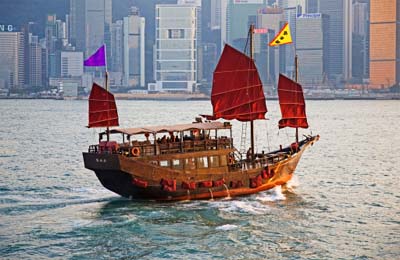 It is owing to the spectacular harbor view that high among the list of ‘must do’ things in Hong Kong (which include a cable car trip across to Lantau Island, which has some beautiful monuments) is a trip to Victoria Peak. Dinner at a restaurant in Victoria Peak with a view of the glittering lights of Hong Kong below is especially popular. Restaurants abound, including one rumored to be owned in joint partnership between Hollywood super stars Jackie Chan and Tom Hanks.
It is owing to the spectacular harbor view that high among the list of ‘must do’ things in Hong Kong (which include a cable car trip across to Lantau Island, which has some beautiful monuments) is a trip to Victoria Peak. Dinner at a restaurant in Victoria Peak with a view of the glittering lights of Hong Kong below is especially popular. Restaurants abound, including one rumored to be owned in joint partnership between Hollywood super stars Jackie Chan and Tom Hanks.
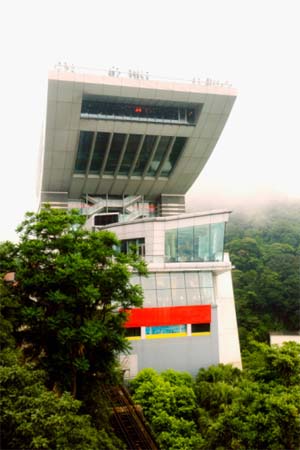 The view from the Peak is truly awesome, but the generally festive and touristy bustling ambience of the places – which includes, by the way, a Madame Tussauds, robs it of the quiet intimacy in which such scenery is better viewed. In this sense I probably preferred the view from the hotel room: a less far-reaching and spread out view perhaps, but equally breathtaking and far more intimate.
The view from the Peak is truly awesome, but the generally festive and touristy bustling ambience of the places – which includes, by the way, a Madame Tussauds, robs it of the quiet intimacy in which such scenery is better viewed. In this sense I probably preferred the view from the hotel room: a less far-reaching and spread out view perhaps, but equally breathtaking and far more intimate.
More than the view from the Peak, what fascinated me was the tram ride upwards reserved for the British rulers till not long ago. Just as there were roads in Indian hill stations reserved for the exclusive use of the Englishman, in earlier times the people of Hong Kong were not permitted to set up residence near the Peak. Before the tram service to the Peak started British administrators and their wives would be taken up in a palanquin carried by Chinese laborers: there are meticulously drawn illustrations depicting the toil of those arduous journeys put up near the starting point of the tram.
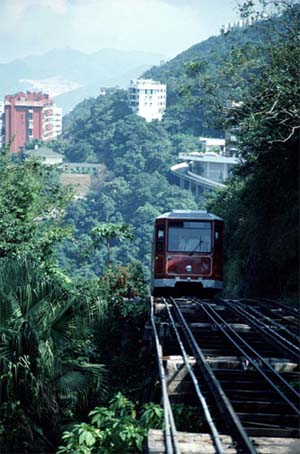 What gives this tram ride its distinctive character as compared with tram rides in other parts of the world isn’t the very steep journey it takes – which does sometimes make you fear once you have ascended a certain distance that the cables will not be able to hold up the tram anymore and that it will surely snap hurtling the machine downwards which together with you and all your co-passengers will fall towards the city below – but the fact that your ride begins in a crowded part of Hong Kong; and as you move up towards the mountain you pass barely yards away from high rise buildings at the most unusual and unbelievable angle. You get the incredibly strange feeling, perhaps experienced by the mythical Spiderman or better yet an eagle that can ascend at different angles. If you allow your mind to imagine it there is a fascinating illusion that your tram is literally ploughing through a concrete jungle.
What gives this tram ride its distinctive character as compared with tram rides in other parts of the world isn’t the very steep journey it takes – which does sometimes make you fear once you have ascended a certain distance that the cables will not be able to hold up the tram anymore and that it will surely snap hurtling the machine downwards which together with you and all your co-passengers will fall towards the city below – but the fact that your ride begins in a crowded part of Hong Kong; and as you move up towards the mountain you pass barely yards away from high rise buildings at the most unusual and unbelievable angle. You get the incredibly strange feeling, perhaps experienced by the mythical Spiderman or better yet an eagle that can ascend at different angles. If you allow your mind to imagine it there is a fascinating illusion that your tram is literally ploughing through a concrete jungle.
Comparisons between Hong Kong and Singapore are inevitable. Hong Kong, I have to say, compared with Singapore was for me in some ways a disappointment. The average Hong Kong resident lacks both the English language skills and the general sophistication of his Singaporese cousins.
I am a ‘chai’ or tea addict and the rainy weather in which I had landed further whetted my appetite for more cups of tea. So I went looking to buy some tea bags in the nearby shopping mall, which I entered through an entrance at our hotels lobby. As an aside I should mention that one of the entrances from the hotel led into the Shopping Mall and one of the entrances from the Mall led to a train station, which connected up to yet another Mall. While you have incredibly large shopping malls in Singapore and Dubai I haven’t seen a city like Hong Kong where so many buildings interconnect – you can spend an hour passing from building to building without having any sense of what the weather outside is like.
It was a fairly large well-stocked department store that I finally entered, and after a minute of wandering about, in order to save time I asked a young, sallow complexioned, uniformed attendant where I could find ‘tea’. He looked puzzled. ‘Chai’ I said, changing the word, confident that it was a globally used term beyond all linguistic boundaries. He still looked blank, and apologetically pointed out to the female manager at the counter. 'Graduate' he whispered, as if it needed one to be a graduate to understand what I had hitherto assumed (mistakenly evidently) to be one of the most universally understood words in the world. When I went across to the lady, even she looked blank at both ‘tea’ and ‘chai’. I thought at this point that they probably just didn’t have the stuff, but after a few minutes of independent, though not very hopeful searching came across some Lipton Yellow label as well as some Earl Grey.
Tea comes from China originally and Hong Kong itself boasts of many teahouses, so it was purely a linguistic problem. Of course you have many Hong Kong residents fluent in English, but throughout the next few days when I met with many ordinary Hong Kong residents I discovered a surprising lack of acquaintance with even ordinary English words. This was partly a problem due to accent. Whenever I said ‘Metropolitan’ to a taxi driver, to confirm that we were talking about the same place he would respond with a word that sounded to me more like ‘Marco Polo’; this served to create confusion because there was indeed a Marco Polo hotel in Hong Kong.
‘Go to Stanley Market’ recommended the Floor Manager, a Chinese girl by the name of Linda. ‘Everyone goes there. Once you’ve finished with the big Malls.’ She smiled. ‘I assume you have already done that.’
Stanley Market it turned out was just a regular touristy kind of place, a bazaar of sorts with all kinds of Chinese knick-knacks, souvenirs and bargains. I am not a big shopper, and hoped rather to take in a bit of Chinese culture, but the hotel was at a loss to suggest any Chinese style entertainment for the evening. There was no Chinese Opera or anything authentically Chinese besides, although we could have gone and seen ‘Galaxy’ a predominantly Western style ballet by the Hong Kong Ballet being performed at the Hong Kong Cultural Centre. So I finally ended up seeing a Hollywood movie with Chinese subtitles.
The English movie I went to see was a not unfunny movie called ‘Seventeen’ – a story about a failed salesman who revisits and relives his past, the crucial juncture in his life where he was seventeen and the basketball star at school, who had opted out of a sporting career to marry his pregnant girl friend – in a movie hall located within ‘Element’ one of the prominent shopping malls closer to my hotel.
It was a small hall, but quite full and though it was sub-titled and not dubbed, the audience seemed to enjoy it a great deal. There were youngsters and families, basically all kinds of people who had come to watch the movie, including a single mother with her child just next to me. In India, Western films are increasingly finding an audience but it is mostly with the younger people.
Did the Chinese in Hong Kong possess greater openness to Western culture than India? I don’t think so. It is my view that in Hong Kong, Chinese culture is simply not ‘solid’ enough to fill up intellectual and cultural space. There are gaps there and it is owing to these gaps that there is greater interest in Hollywood and other manifestations of Western culture.
Despite VS Naipaul’s famous book ‘India: A Wounded Civilization’ and the truth indicated in the chosen title of his treatise, after journeying through Chinese territories I have come to believe that in India, despite centuries of British rule, there is yet present a stronger more vigorous culture. Chinese culture in Hong Kong has suffered more erosion. On mainland China itself the erosion has taken place due to six decades of communist rule, which has been far more devastating, in terms of culture, than Soviet style. In Hong Kong it has been more the British presence.
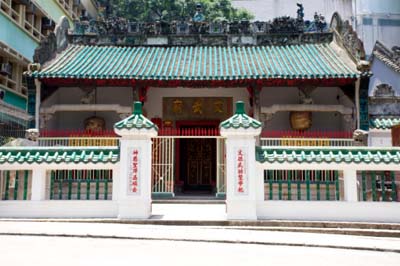 I felt the loss of religious and cultural heritage most acutely when we went to see the Man Mo temple in Hong Kong. The temple – intriguingly dedicated to Man, the Chinese God for literature and Mo the Chinese God of martial arts – is not very tall, but is further dwarfed by virtue of being surrounded on all sides by tall skyscrapers. Much fuss is made about this temple, but that is because it appears as some kind of an oddity within this city’s overpowering business ambience. It carries nostalgic value but is not very remarkable in architectural terms.
I felt the loss of religious and cultural heritage most acutely when we went to see the Man Mo temple in Hong Kong. The temple – intriguingly dedicated to Man, the Chinese God for literature and Mo the Chinese God of martial arts – is not very tall, but is further dwarfed by virtue of being surrounded on all sides by tall skyscrapers. Much fuss is made about this temple, but that is because it appears as some kind of an oddity within this city’s overpowering business ambience. It carries nostalgic value but is not very remarkable in architectural terms.
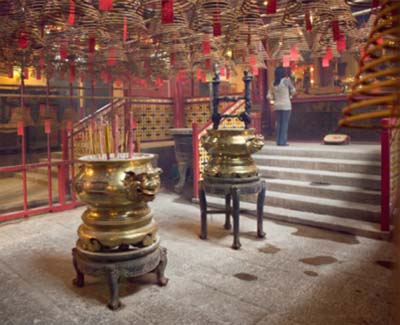 By way of distinctive atmosphere it has thousands of incense sticks burning which choke the visitor if he stands there long enough and fairly primitively carved figures of the two Gods inside, The site on which the temple stands must be worth millions in the property market but it has been retained; perhaps because these days Hong Kong has less to offer in cultural terms in an authentic Chinese sense! There is a conservation movement that has now started in the city, but much of old Hong Kong has been razed to the ground to make way for the skyscrapers. The Chinese Methodist Church in Wan Chai was destroyed some years ago, and replaced by a modern building. Similarly the Johnston Road shop-houses were destroyed to make way for a high-rise structure; only a single shop was left just to give people a glimpse of the past. As the physical symbols of a city’s culture are destroyed, the mindset of the denizens also inevitably changes. The tourist guide spoke of the Man Mo temple in bookish terms as he did when he spoke briefly of Taoism.
By way of distinctive atmosphere it has thousands of incense sticks burning which choke the visitor if he stands there long enough and fairly primitively carved figures of the two Gods inside, The site on which the temple stands must be worth millions in the property market but it has been retained; perhaps because these days Hong Kong has less to offer in cultural terms in an authentic Chinese sense! There is a conservation movement that has now started in the city, but much of old Hong Kong has been razed to the ground to make way for the skyscrapers. The Chinese Methodist Church in Wan Chai was destroyed some years ago, and replaced by a modern building. Similarly the Johnston Road shop-houses were destroyed to make way for a high-rise structure; only a single shop was left just to give people a glimpse of the past. As the physical symbols of a city’s culture are destroyed, the mindset of the denizens also inevitably changes. The tourist guide spoke of the Man Mo temple in bookish terms as he did when he spoke briefly of Taoism.
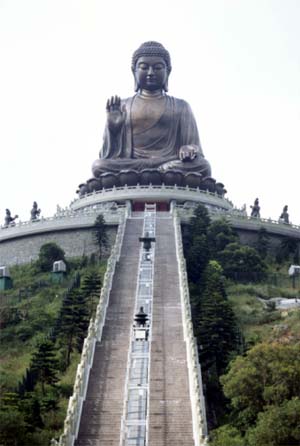 In sharp contrast with Hong Kong, in the nearby, and relatively tranquil island of Lantau you can find abundant greenery, temples, and impressive monuments, including the awesome Giant Buddha gazing down at the visitor at Po Lin Monastery. As far as Hong Kong itself is concerned its links with its religious past seem considerably eroded as a result both of modernization and its colonial history. Everyone wants to be prosperous, but culture ought to thrive where there is prosperity; paradoxically enough it sometimes poses a threat to culture. And oddly enough sometimes poverty protects culture.
In sharp contrast with Hong Kong, in the nearby, and relatively tranquil island of Lantau you can find abundant greenery, temples, and impressive monuments, including the awesome Giant Buddha gazing down at the visitor at Po Lin Monastery. As far as Hong Kong itself is concerned its links with its religious past seem considerably eroded as a result both of modernization and its colonial history. Everyone wants to be prosperous, but culture ought to thrive where there is prosperity; paradoxically enough it sometimes poses a threat to culture. And oddly enough sometimes poverty protects culture.
I felt some sense of loss of Hong Kong’s religious heritage when I visited the Man Mo temple and so also I felt a sense of loss of Hong Kong’s cultural inheritance when I visited Aberdeen a so-called fishing village that the visitor is taken to as a much flaunted stop on the city tour. The Aberdeen fishing village named after the famous Scottish city may have its name replaced in coming years; and in all fairness it cannot even be called a fishing village any more.
It was a bit of an Emperors New Clothes tour to be honest. By this I mean, that just as the Emperor had no clothes in reality, in truth there exists no fishing village. As we approached the village in our mini bus, in order to prepare us for it perhaps our guide mentioned how some families from the fishing village had moved to the city.
We still expected to see a active if not thriving fishing village but as we wandered about the waters on a large boat we saw just mostly men smoking or having a drink. Just two odd families. The waters were full of abandoned wooden crates, and other primitive vessels that masqueraded as functional boats. As a matter of fact the hundred odd boats, mostly derelict and broken down vessels, were all quite deserted. It was not how the tour company had advertised it but in point of fact we were touring an abandoned, practically deserted fishing village! There didn’t seem much point in doing so.
‘I came here for my honeymoon in the early seventies,’ said Catherine West, an elderly Englishwoman in our group. ‘It was a real fishing village at the time.’
Gazing at the debris and scores of abandoned vessels the place was reminiscent of a junkyard really, only this one was on water. A single very large boat stood on the waters like a solitary water skyscraper representing the concrete city that just stood outside. This boat was an over glitzy affair, which showed clear signs of activity, renovation and of being looked after.
It was the Jumbo Floating Restaurant, the largest floating vessel in the world, described in travel brochures as being 'kitsch - cool'. We could see tables being laid out. There was room for more than a hundred guests aboard this boat, but for obvious reasons they only served dinner. Lunch would be too prosaic an affair for it would reveal to the visitor the reality of the Aberdeen fishing village, you see, the fact that it did not exist. Dinner was another matter. You could have a romantic meal in candlelight, see the vague outline of various floating objects on the sea and imagine that possibly there were residents inside those wooden structures tired after a hard day of fishing and sleeping inside!
Hong Kong has been successfully alienated from its religious, cultural and intellectual culture. Despite its evident prosperity, it too is to all accounts a wounded civilization.
What gives Hong Kong a unique place in history is that fact that it is perhaps a special example of a colonized territory, where in recent history the colonial connection may have actually worked to the benefit of the residents. In other words it has been colonized, yet it has been amazingly enough prosperous at the same time. Many of us looking from the outside have wondered if Hong Kong has been prosperous because of its British connection or in spite of it! Be that as it may, the city and its residents may have prospered in terms of wealth, but there has been a corresponding loss of religious and cultural heritage here: the rise and fall of Hong Kong.
It is said that there used to exist, many years ago, hundreds of incense shops all along the coast of Kowloon. This was the reason it is claimed by many, why the area was given the name Hong Kong, which in Cantonese translates into ‘Fragrant Harbor’. As the city’s buildings have reached for the sky, it appears that some of that fragrance has gone.
06-Dec-2009
More by : Rajesh Talwar